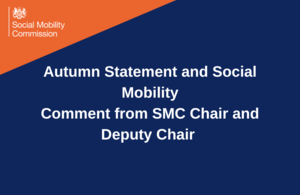Autumn Statement and Social Mobility
Comment from SMC Chair Katharine Birbalsingh and Deputy Chair Alun Francis on the Autumn Statement

Autumn Statement and Social Mobility Comment from SMC Chair and Deputy Chair
In more stable times, assessing the social mobility implications of policy is a difficult challenge. In an unpredictable period, this becomes much more complex. Every area of policy has some impact or another, and there is a danger of losing focus. To address this, the Social Mobility Commission is aiming to focus on the “big ticket” items where the evidence of impact is greatest. These are the policy areas which we hope governments, now and in the future, will acknowledge as their priorities in ensuring that this country nurtures and allocates talent in the best possible ways. They are described in our Work Plan and will shortly be set out in more detail in our Strategic Plan, which will provide the wider narrative about our approach and why we believe it is relevant to the current period.
Our main areas of focus will be on education, routes to work, and economy and enterprise. Assessing the Autumn Statement in the light of these three priorities presents a mixed picture. We share the ambition to grow the economy. Much of the debate about social mobility is focussed on relative mobility, which is the comparison between different groups, in terms of socio-economic background and access to higher level employment and income. This is an important part of the story, but far too little attention has been given to absolute mobility – which is when people move up, either in income or occupational status, compared to their parents. Arguably, this is the bigger challenge currently. Last week, the Institute of Fiscal Studies, produced a thought provoking report on intergenerational mobility, and the extent to which our younger generation, whatever their social background, are facing diminished opportunities compared to older people. Far too many people have seen their real incomes improve very little over the past decade. And there is a strong geographical aspect, which means that some parts of the country experience a disproportionate share of the problem.
The only solution to this is to grow the economy and to do so in ways which spread innovation and improved productivity across the whole of the country. We recognise that there is a strong commitment to this in the Autumn Statement, and a recognition that this requires fiscal and monetary stability, innovation and strong public services. In terms of the detail, it is too early to form judgements about how well this might work. However there are three aspects to which we would draw attention at this stage. First, is to commend the commitment to the most vulnerable. This does not, in itself, improve social mobility, as this depends on a range of other factors as well as income – but it does offer a degree of protection against opportunity diminishing for those families and their children who are most exposed to financial insecurity. We also commend the additional funding for schools, for much the same reason. It will not offset all of their pending challenges, but is likely to mitigate some of the most difficult pressures caused by rising costs. However there are two areas of substantial concern: the lack of any reference to the impact of financial pressures on early years or to further education.
It is highly unlikely that any government can meet its ambitions for a strong economy without addressing skills. From a social mobility point of view, this is about how we create and open opportunity for high skilled and well paid employment, but is also about finding some new solutions to our biggest national problem: the number of young people and adults with low levels of formal qualifications. In large part this is about addressing deficiencies in basic skills, including literacy and numeracy – as this is a major impediment to the progress of individuals, and the capacity of the economy to innovate and improve productivity.
It is encouraging that the Autumn Statement does refer to skills and acknowledges the importance of current proposals to improve the skills system. However, it is silent on the risks posed by the current economic crisis to the organisations charged with delivering these outcomes. We know that early years development is critical to developing the cognitive and non-cognitive skills which enable children to do well, and we are supportive of the reforms to post-16 education and training which seek to strengthen technical and vocational pathways – because these aim to recognise and reward the wider range of talents which people have and which the labour market needs.
More funding is not always the answer to every problem, and is never the whole answer to every problem. How early years is delivered and how skills are taught are both extremely important areas of interest for us. Nothing can be delivered, however, without stable institutions – and there is evidence, in both early years and further education, that current funding levels are insufficient to recruit and retain high quality staff, or to secure the institutional stability needed to maintain current levels of service while things improve. We are concerned about the implications of this, both for the individuals who are affected (nearly 2 million people are enrolled at further education colleges) and the potential drag this may well have on the longer term ambition to deliver a stronger economy.
Katharine Birbalsingh OBE, Chair of the Social Mobility Commission
Alun Francis OBE, Deputy Chair of the Social Mobility Commission